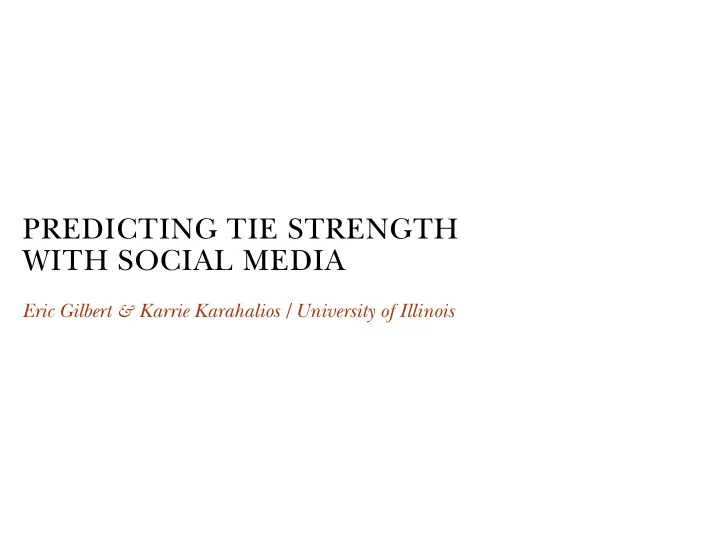

PREDICTING TIE STRENGTH WITH SOCIAL MEDIA Eric Gilbert & Karrie Karahalios University of Illinois
kevin casey lucas leslie
TIE STRENGTH concept & impact The strength of a tie is a (probably linear) combination of the amount of TIME , the emotional INTENSITY , the INTIMACY (mutual confiding), and the reciprocal SERVICES which characterize the tie. — Granovetter STRONG TIES are the people you really trust. WEAK TIES , conversely, are merely acquaintances.
TIE STRENGTH concept & impact 7,000+ papers cite TSOWT firms with right mix of ties get better deals strong ties can affect mental health
TIE STRENGTH dimensions AT WHAT POINT is a tie to be considered weak? … Do all four indicators count equally toward tie strength? — D. Krackhardt GRANOVETTER’S intensity , intimacy , duration & services WELLMAN’S emotional support LIN’S social distance BURT’S structural
THE MAPPING PROBLEM
RESEARCH QUESTIONS R1. The literature suggests seven dimensions of tie strength: INTENSITY , INTIMACY , DURATION , RECIPROCAL SERVICES , STRUCTURAL , EMOTIONAL SUPPORT and SOCIAL DISTANCE . As manifested in social media, can these dimensions predict tie strength? In what combination? What are the limitations of a tie strength model based SOLELY R2. on social media?
THE DATA overview 2,184 assessed friendships from 35 university students & staff described by 70+ numeric indicators
DATA COLLECTION methodology &
ASSESSING TIE STRENGTH participant interface
ASSESSING TIE STRENGTH participant interface
ASSESSING TIE STRENGTH participant interface
ASSESSING TIE STRENGTH participant interface
ASSESSING TIE STRENGTH participant interface
ASSESSING TIE STRENGTH participant interface
ASSESSING TIE STRENGTH participant interface
ASSESSING TIE STRENGTH participant interface
PREDICTIVE VARIABLES intensity part.-initiated wall posts 55 friend-initiated wall posts 47 wall words exchanged 9,549 inbox messages together 9 inbox thread depth 31 part.’s status updates 80 friend’s status updates 200
PREDICTIVE VARIABLES intimacy participant’s friends 729 friend’s friends 2,050 days since last comm. 1,115 wall intimacy words 148 inbox intimacy words 137 together in photo 73 miles between hometowns 8,182 mi
PREDICTIVE VARIABLES social distance age difference 5,995 days # occupations difference 8 educational difference 3 degrees political difference 4
PREDICTIVE VARIABLES structural mutual friends 206 groups in common 12 tf-idf of interests & about 73
PREDICTIVE VARIABLES reciprocal services links exchanged by wall 688 applications in common 18 emotional support positive emotion words 197 negative emotion words 51
PREDICTIVE VARIABLES duration days since first comm. 1,328
STATISTICAL METHODS
THE MODEL structure & performance STRUCTURE DISTANCE
MOST PREDICTIVE by |beta| Days since last communication –0.762 Days since first communication 0.755 Intimacy × Structural 0.4 Wall words exchanged 0.299 Mean strength of mutual friends 0.257 Educational difference –0.223 Structural × Structural 0.195 Reciprocal Serv. × Reciprocal Serv. –0.19 Participant-initiated wall posts 0.146 Inbox thread depth –0.137 Participant’s number of friends –0.136 Inbox positive emotion words 0.135 Social Distance × Structural 0.13 Participant’s number of apps –0.122 Wall intimacy words 0.111
MOST PREDICTIVE by |beta| Days since last communication –0.762 Days since first communication 0.755 Intimacy × Structural 0.4 Wall words exchanged 0.299 Mean strength of mutual friends 0.257 Educational difference –0.223 Structural × Structural 0.195 Reciprocal Serv. × Reciprocal Serv. –0.19 Participant-initiated wall posts 0.146 Inbox thread depth –0.137 Participant’s number of friends –0.136 Inbox positive emotion words 0.135 Social Distance × Structural 0.13 Participant’s number of apps –0.122 Wall intimacy words 0.111
MOST PREDICTIVE by |beta| Days since last communication –0.762 Days since first communication 0.755 Intimacy × Structural 0.4 Wall words exchanged 0.299 Mean strength of mutual friends 0.257 Educational difference –0.223 Structural × Structural 0.195 Reciprocal Serv. × Reciprocal Serv. –0.19 Participant-initiated wall posts 0.146 Inbox thread depth –0.137 Participant’s number of friends –0.136 Inbox positive emotion words 0.135 Social Distance × Structural 0.13 Participant’s number of apps –0.122 Wall intimacy words 0.111
THE MODEL details 1 prediction 0 0 1 participant
THE MODEL details 1 + prediction � + 0 � 0 1 participant
THE MODEL details 1 87.2% accuracy � 2 (1, N = 4368) = 700.9 + p < 0.001 � + 0 � 0 1
LIMITATIONS high residuals “ Ah yes. This friend is an old ex . We haven't really spoken to each other in about 6 years, but we ended up friending each other on Facebook when I first joined. But he's still important to me. We were best friends for seven years before we dated. So I rated it where I did (I was actually even thinking of rating it higher) because I am optimistically hoping we’ll recover some of our “best friend”-ness after a while. Hasn't happened yet, though. error: ~0.5
LIMITATIONS high residuals We were neighbors for a few years. � I babysat her child “ multiple times. She comes over for parties. I'm pissed off at her right now, but it's still 0.8. � ;) Her little son, now 3, also has an account on Facebook. � We usually communicate with each other on Facebook via her son's account . This is our “1 mutual friend.” error: ~0.5
IMPLICATIONS for theory Social network analyses of large-scale phenemona 1 Weights on dimensions & importance of structure 2 Is there an upper bound? Do important things get left out? 3
IMPLICATIONS for practice MODEL TIE STRENGTH TO… prioritize activity updates. 1 broadcast especially novel information. 2 make better friend introductions. 3 build more informed privacy controls. 4
21 get backstage 48 of your 203 friends 27 get in next 48 >
21 get backstage 48 of your 203 friends drag to reassign 27 get in next 48 >
CONTRIBUTIONS of our work A MODEL of tie strength SPECIFIC WEIGHTS on tie strength’s dimensions THE ROLE OF STRUCTURE in modulating tie strength
ERIC GILBERT & KARRIE KARAHALIOS University of Illinois at Urbana-Champaign [egilber2, kkarahal]@cs.uiuc.edu
Recommend
More recommend